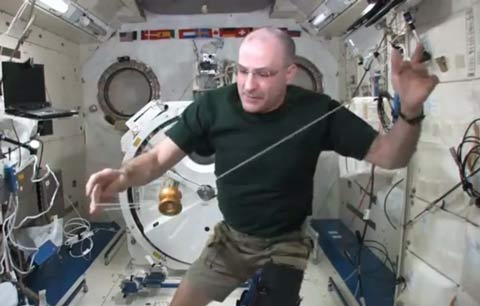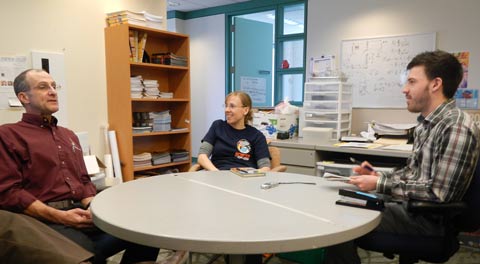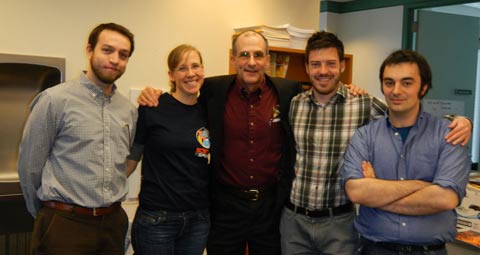Interview with Astronaut Don Pettit
February 22, 2013
Many children aspire to venture into space, exploring unknown frontiers beyond the pale blue dot we call home. Oftentimes, that childlike enthusiasm and curiosity fades as we transition into adulthood. But astronaut Don Pettit is different.
He has an infectious zeal for anything involving math, physics, chemistry, exploration, space and education. His passion and drive have garnered him some impressive accomplishments: He’s travelled 10’s of millions of miles around the Earth and spent more than a year of his time in space on the International Space Station.
Despite his busy schedule on the space station, Don devoted much of his off-duty time to science education and outreach with his engaging science experiments in microgravity. In our Science off the Sphere video series, Don showcased floating water blobs, knitting needle orbits, and makeshift didgeridoos.
Earlier this week, we had the opportunity to ask Don Pettit a few questions about living in space, colonizing Mars, and riding aboard a Russian spacecraft. What follows is an abridged version of our conversation.

Don shows off his microgravity yo-yo tricks during a Science off the Sphere video.
PC: When did you first become interested in math, science and engineering?
Ever since I was a kid. I was always taking things apart.
My dad would bring things home, like an old alarm clock specifically for my brothers and I to take apart. One of my best birthday presents was from my older brother. He had been to a junkyard, and he gave me an old automatic transmission. I was probably 12 years old when I got that, so I took it apart and figured out how it worked.
Those were the toys I played with.
PC: What are some of the things you do when you’re on the ground as an astronaut?
Most of what we do for our day job on the ground is technical legwork to support human spaceflight. You may be doing something to help one of your colleagues prepare and fly for their mission, or you may be doing something like working on the cockpit layout on a new vehicle.
PC: Why do we need a manned spaceflight in addition to robotics and probes?
What you need is both. There are things that humans can do better than we have the capability of designing any machine to do. And there are things that machines can do that are better than what a human can do. You want a happy marriage between those. That will make the best exploration program.
As an example, you look at satellites that take pictures of Earth. Typically, they turn them off over the ocean or they don’t bother to collect data because it’s the ocean. They don’t point their satellites at sun glint — specular reflection of sun off the ocean water — b/c you have sensors that you don’t want to damage.
When you put astronauts on orbit, we don’t have enough common sense to know that you’re not supposed to look at the sun. We’ll look at the specular reflection [ or mirror-like reflection] of sunlight off the ocean where satellites are programmed not to look because they don’t’ want to damage the satellite.
We said, “Wow, there’s structure you can see in the ocean,” only in the glint. You can see small differences in elevation of a few centimeters when you look at the specular reflection on the ocean from the vantage point of orbit. You can see all kinds of fascinating structures that are in the ocean that are overprinted by the wave action.
You can see these giant vortices that come off somewhere spawned in the Central American region of the Atlantic. These spiral vortices go up the whole East Coast of the U.S. , way up past Newfoundland then go across the ocean. You’ll get one of these vortices that maintains its coherent state for months. They’ll entertain whole ecosystems. You can see these if you look in sun glint.
In this example, you use human beings in an orbital platform to make the discovery observations. Then you can program a robot or a satellite into collecting tons of data in a way that’s better and more reproducible than what a human being can do.

Our interview at Physics Central's offices
"Everything Surprises You"
PC: Was there anything that surprised you about living in a microgravity environment?
Everything surprises you.
You get these jaw-dropping observations. That’s a characteristic of being in a frontier environment. I think it’s a reason why some human beings are drawn to frontier environments. Frontier environments are places that are rich in potential discovery because you can once again see the world through the eyes of a child.
You see things as if you were a child again because nothing fits your normal experience; your normal intuition doesn’t apply.
PC: Do people recognize you from your videos?
No. If I walk into a room of geeky physics types, but if I walk into the streets I’m Joe Nobody, and I’m happy with that.
PC: How do you stay in touch with your family during your missions?
Don: We’ll have a private family conference once a week for 15 minutes. It’s a two-way video using NetMeeting.
We have an internet telephone that as long as you have KU band coverage – maybe for 30-40 minutes out of every hour we have that coverage.
We also have email but it’s like offline email. You send emails and store it offline, and you get two email syncs a day. If I send an email to my family in the evening, it’ll be a day or day and a half before I get a response to the email.
"Like being in a series of explosions followed by a car wreck"
PC: How did going up in a Russian Soyuz capsule compare to going up in the Space Shuttle?
The Russians make a fine spacecraft. It’s a workhorse. They have a different philosophy of designing hardware than the U.S. I won’t say it’s better; I won’t say it’s worse; it’s different and it works exceedingly well.
The Shuttle uses a combination of solid rocket and hydrogen oxygen. Soyuz goes all the way to orbit on kerosene and oxygen, so it’s all liquid. Solid rockets make a lot of shake and noise and vibrations. When you’re riding the Shuttle, at least the first 2.5 minutes when you’re on the solids, it’s a pretty rough ride. Soyuz, since it’s liquid propellant all the way, it’s smooth. If you’re going to launch on two vehicles and compare them, the Shuttle is a much rougher launch than the Soyuz.
It’s different on the way back. The Shuttle, since it lands like an airplane, my Shuttle landing was smoother than some of the Southwest airlines landings that I’ve been on. I can say that because I know at least three former astronauts who are pilots for Southwest airlines.
Shuttle landings are smooth, Soyuz landings are really rough. One of my colleagues described it like being in a series of explosions followed by a car wreck. That’s his description of a Soyuz landing, and it’s not far off.
For my first flight, I launched on the shuttle, and I came home on my Soyuz. Someone pointed out I did that backwards because I launched on the rough vehicle and came home on the rough vehicle.
"Kicking and Screaming"
PC: If you could be the first person to go to Mars on a one-way mission, would you go?
It depends what you mean by a one-way mission. If it’s a one-way death wish, you have one month of life support you have a big party then everybody dies. That’s not for me. One-way missions have that kind of connotation.
What I like to say is: would I immigrate to Mars? Immigration connotes you have enough social infrastructure there to live out the duration of your natural life in this new world.
People didn’t immigrate to the New World with the idea that they’d live there for a month and die. Nobody would’ve done that. They immigrated to the New World because they wanted to start a new life, and they had every expectation that if they worked hard, they could live a long and fruitful life by coming to the New World.
In that model, I would immigrate to Mars and never come back to Earth. If you had an orbital environment where you would be living in a city in an orbital environment, I would take my family kicking and screaming and I’d immigrate on the next rocket and never come back to Earth again.
I feel strong enough about spaceflight that I could go into space whether it’s an orbital environment or a planetary surface environment like the moon or Mars and I would be perfectly happy immigrating to any kinds of those environments and never coming back to the planet.

Don Pettit and most of the Physics Central team.
PC: There was a communications blackout that happened recently aboard the International Space Station. Did anything like that happen to you?
Actually that can be a delightful thing because it’s like being out of earshot of mother and then you can do what really needs to be done. Shortish periods of comm. loss can actually be seen as a good thing by the crew.
PC: What are some of the scariest things you’ve experience while in space?
One of the scariest things that happened to me was when I was playing with a big blob of water and it started to float off from where I wanted it and I was afraid that it was going to get into some equipment that it didn’t need to get into. So I had to quickly get a towel and lasso it.
Just flying on the space shuttle is about a 1/70 chance of loss of vehicle and crew. A real world way of thinking about that probability is to have a coin and 2 dice. There’s a 1/72 chance of rolling snake eyes and flipping heads.
PC: Do you have any advice for aspiring astronauts or microgravity yo-yoers.
Yes. Space is a place where human beings weren’t meant to go. We need to have spacesuits; we need spacecraft; we need air to breathe; we need food; we need all this stuff. We need rocket propulsion; we need communication.
It takes math, science and engineering in order to not only build this stuff but to understand how it works and how to fix it. If you want to explore space, you need to understand math, science and engineering. If you make a mistake it’s no longer minus 10 points on a midterm exam.
If students want to come and do my job, because of the frontier nature of space and the current state of our technology, they have to understand math science and eng. You have to know how to take care of the machines that in turn allow you to live and if you don’t learn how to do that, you’re gonna be in a world of hurt.
-Brian Jacobsmeyer














